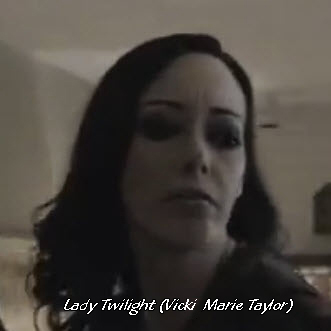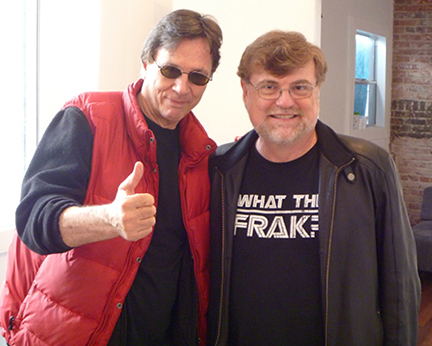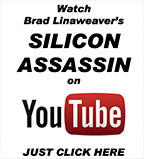Silicon Assassin
The Man of the Hour
by Jerry Jewett
Troubled times beget troubling art: witness Zamyatin's We, Huxley's Brave New World, Picasso's Guernica or Orwell's 1984. When life has become torturous or fearsome for ordinary people owing to usurpation of their rights and liberties by high-handed "executives," "administrators" or "leaders," conflict and strife abound. And in the early phases of consolidation of power after a coup d'état, things often go still worse for the subjected hordes. The early Soviet era in 20th century Russian history, or Hitler's acts of brutal police power after the Reichstag Fire, exemplify this.

Creative, freedom-loving people do not kneel to tyranny, they fight it. The two-thirds complete work of taking Rand's Atlas Shrugged to the big screen, and the forthcoming release of the cinematic rendition of J. Neil Schulman's epic classic Alongside Night remind us that the voices of principled protest in opposition to tyranny can be powerful and informative while also entertaining and inspiring.
The powerful theme of resourceful human resistance to the unremitting jack-booted march of the Police Power against Individual Liberty is portrayed in Silicon Assassin. This production brings science fiction writing and sci-fi film-making to anyone with a quality notebook computer and a good Internet connection, including via a link at Mondo Cult Online. [Look for Richard Hatch at the top of the page and click there—Ed.]
Writer-producer Brad Linaweaver had a long-time friend and confidant in Chuck Hammill, a venerable libertarian activist and thinker. [Hammill is the author of From Crossbows to Cryptography: Thwarting the State Via Technology—Ed.] When Mr. Hammill died, he left a bequest inviting Mr. Linaweaver to produce a libertarian story-line showing the return to freedom of a subjected people, following an authoritarian takeover by the State. Linaweaver, with his extensive network of Hollywood industry connections on tap to complete the production, has outdone himself by crafting this series of episodes.
Science fiction legend Richard Hatch as The Silicon Assassin and horror movie icon Brinke Stevens as President Medusa play central roles as antagonists. This science fiction web series features work by people with many decades of experience in film-making, whether in front or behind working the cameras, or working the many other elements that blend to make a good movie. A host of talents converge harmoniously in this recent (2012-2013) production. The episodes are as follows:
"Problem Child" directed by Richard Hatch
"Medusa Speaks" (an epilogue to "Problem Child") directed by Jeff Szalay
"The Wall," directed by Christopher Douglas-Olen Ray
"Dead Reckoning" directed by Edward L. Plumb
"The Medusa Meeting" directed by Christopher Douglas-Olen Ray
"Window of Opportunity" directed by Christopher Douglas-Olen Ray
"Silicon Assassin music video" directed by Marie Ilene (theme by Wendy Jacobson)
The time is the very near future, the film's locale is Los Angeles, as the nexus of anti-Government activity, and the situation is that President Medusa has consolidated all power in her own hands, ramrodding The American Godly Republic. That Republic is the corroded and dispirited residue of the United States of America. So many "emergency measures" and Presidential Orders have greased the skids of the Slippery Slope, that the State has the upper hand and looks to be on the verge of consolidating all power. The convergence of political forces and interests under way in the autumn of 2013 has coalesced in Movie Time, creating a plausible dystopia where the economy is in shambles, the State claims all power, the citizen has been reduced to a subject and all hope seems lost.
 If not for some atavistic Americans who recall "the old way," bolstered by a shadowy league of renegade scientists bent on restoring freedom using revolutionary technology, the battle would be over for suppression of the citizenry and the obliteration of freedom, in the sense that any common person could understand.
If not for some atavistic Americans who recall "the old way," bolstered by a shadowy league of renegade scientists bent on restoring freedom using revolutionary technology, the battle would be over for suppression of the citizenry and the obliteration of freedom, in the sense that any common person could understand.
At the start of the movie, one gets the grim picture of a totalitarian state that would have been the envy of Erich Honecker, East Germany's post-war dictator. The press has been quashed to improve morale, though that effect is not visible. The sole-source American Channel (like a Voice of America speaking to a conquered America) carries the message that nothing is more dangerous than cheap fast technology that can fall into the wrong hands.
But the renegade scientists have fashioned a small crew of counter-agents. This is the Silicon Assassin team—human-looking cyber morphs (artificial computer-generated creatures), whose principal means of dispersion is via the Internet, into and out of people's personal or laptop computers—though they also do walk for short distances. The SA himself (Richard Hatch) has comely sidekicks, mainly Lady Twilight (Vicki Marie Taylor) and Bubbleblonde Girl (Paula LaBaredas) but also intermittently joined by Deadly Tween (Victoria Plumb) and the occasional Lady Twilight #2 (Erica Duke). The lot of them are armed with the best ray guns, which noted armorer L.J. Dopp Arsenals, can supply.
The task of the Silicon Assassin, Lady Twilight and Bubbleblonde Girl is to destroy those humans who initiate the use of force against others, satisfying an elementary libertarian precept of using violence only in reaction; for the first use of violence is typically the province of Statists, Authorized State Agents and highwaymen.
Professor Rand and his son are the renegade scientists who have made the Silicon Assassin team possible. Professor Rand is portrayed by Charles Hammill, father of Chuck Hammill, aforementioned. As the protagonists are introduced, estimable sci-fi writer John de Chancie makes a cameo appearance, interrupting the conference by hawking our well-beloved Mondo Cult magazine, door to door. Deadly Tween impetuously and thoughtlessly vaporizes him, as if nuisance value alone justified eradication and all humans are targets. This is where the admonition to kill only those initiating force gets voiced.
Vicki Marie Taylor, the principal Miss Twilight, has a lean, self-assured sexiness that would make her the hottest regular character in the series, but for the fact that she is teamed with the exquisite beauty of Paula LaBaredas' Bubbleblonde Girl. The honors divide equally, but both are necessary parts of this story.
As the Episodes unfold, we see that a few people still cling to the hope of restoration of freedom, or at least, some of them live with the hope of escape. The legend of the Silicon Assassin circulates with True Believers and Betraying Doubters, if we may style it that way. An agonizing family conflict over belief in the Silicon Assassin between a husband and wife torn by grief over the death of their daughter, who lost her life in the fight for freedom, is interrupted by raiding agents of Medusa.
Their bloodthirsty style marks them as evil, but the husband, overcoming many hurdles, is able to escape to Free Mexico, which may not be as ironic as it seems at first glance. Even the Mexican Militia longs for the restoration of the free America of bygone days. Someone assembled considerable high-impact weaponry for this episode. When combined with the high-impact actresses who play the pursuers, the concatenation of smoldering beauty and deadly danger makes some kind of a high-water mark.
 The next episode shows the arbitrary, pragmatic and ruthless nature of the forces supporting Medusa, a cold-hearted, callous lot freely sprinkled with pathological killers as well as political opportunists, along with people just concerned with which side of the bread gets the butter. Pitched battles, acts of torture and treacherous, deadly conflicts spring up repeatedly through this series, as one would expect when natural order has been suspended and all rights exist by fiat, fraud or force.
The next episode shows the arbitrary, pragmatic and ruthless nature of the forces supporting Medusa, a cold-hearted, callous lot freely sprinkled with pathological killers as well as political opportunists, along with people just concerned with which side of the bread gets the butter. Pitched battles, acts of torture and treacherous, deadly conflicts spring up repeatedly through this series, as one would expect when natural order has been suspended and all rights exist by fiat, fraud or force.
In a following episode, President Medusa (played by Brinke Stevens, notable scream queen of horror-film fame) supplies the public with some policy updates. She has been taxing the populace at 80%, but she is concerned that people are enjoying too many benefits and paying too little for them. The injustice of that is manifest to her: the people are "stealing" benefits from a benevolent State, clearly an intolerable situation.
According to Linaweaver, Medusa is a bizarre combination of The Bad Left and The Bad Right. The schizoid tension is palpable. Pandering to the theocratic members of her followers, Medusa observes that if God has been getting by on only 10%, so can they. Now there's a new take on the tithe! George Orwell meets Thomas Hobbes when Medusa speaks.
Further along, a vicious melee between the freedom fighters and the oppressors results in an ugly Lewisian event, a heroine getting her neck broken fighting a seemingly invincible bully character, before the Silicon Assassin arrives. He gains the upper hand with his ray gun when, adapting a phrase common in the tactical community ('never bring a knife to a gun fight'), he mocks the aggressors, saying, "You fools bring guns to a ray-gun fight?" with a laugh as he vaporizes the bad guys. Having prevailed, he turns to the hapless freedom fighters he saved, telling them, "The most difficult task of a freedom fighter is to change people's minds. You can change another human's mind, or you can kill him." This meets with relief and good cheer.
Soon, Lady Twilight and Bubbleblonde Girl interrupt a meeting of Medusa with her Emergency Committee and begin vaporizing the closest cohort of Medusa.
Meanwhile, a shady cabal of Medusa supporters meets over a poker table with drinks and bets at hand, playing for high stakes while wrangling about loyalty and strategy in changing political circumstances. Well-known real-world collaborators Fred Olen Ray, Kevin Tenney, Edward L. Plumb and Brad Linaweaver (as Mr. Yog) serve as the card players.
In a sly cameo appearance, Agorist Advisor (and Chuck Hammill colleague) J.Kent Hastings (billed as Mr. Sothoth), seconds Medusa on the need to tax food and alcoholic drink, because people eat and drink too much. He then marvels that Linaweaver got away with writing his landmark, Moon of Ice; a shameless plug.
Do shameless plugs abound? A poster for Plumb's "Boneyard Collection" film, with Brinke Stevens' face featured thereon, provides another bit of levity for those privy to the "inside view." The Linaweaver and Hastings characters' names combine to Yog Sothoth, Lovecraft's beloved menace. There are probably other, subtler such items buried in this fast-moving, free-ranging political drama. With a subtle and scheming mind such as Linaweaver's involved, other hidden nuggets of reference or meaning may lurk, lying in wait to torment the viewer's subconscious in the small hours of the night. Only Mr. Yog and The Shadow know for sure.
Wry commentary on socialized medicine finds a scene. This could be a free-standing short feature on its own. An apparently-deposed functionary of the New State, suffering a potentially fatal malady, stumbles into the lobby of an Emergency Room. He gasps that he needs help, only to be handed a clipboard with some forms which he must complete. Impatient and believing himself dying, he identifies himself as a High Government Official, hoping to over-awe the remarkably attractive young blonde lady working as receptionist.
Upon learning of his status, she produces a further stack of "forms" at least three inches thick, advising him that these additional forms must also be completed before he, a High Government Official, can be tended to. Growing desperate, he produces a fistful of cash with which he hopes to bribe her for better terms and speedier service. In the perfect blend of astonished indignation and perhaps genuine compassion, this worker [played by Jacqui Holland] expresses regret that he has attempted to bribe her, with a modicum of sympathy for his plight. Just before he dies and new elements of dramatic conflict surge in, he says, "I should have gone to my herbalist," then expires.
 ABOVE L-R: Richard Hatch and Brad Linaweaver
ABOVE L-R: Richard Hatch and Brad Linaweaver
This is clearly a commentary on Obamacare. Anyone who has been a patient or even an astute observer at a big public healthcare operation that cares for the indigent (County USC in L.A. comes to mind, but analogs are probably present in many larger population centers) will recognize some themes present in this scene.
The arc nearly complete, the Showdown comes. Medusa is trapped between foes on a footbridge. Faced with capture or destruction by others, she makes her choice.
Long-time Mondo Cult favorite Wendy Jacobson (aka The Fabulous Miss Wendy) wrote and performed the title song. Miss Jacobson conceived of and performs in the music video associated with the film, which was fleshed out and directed by Marie Ilene.
Kudos to all involved for a professional, thought-provoking and fun production.
 Fred Olen Ray - Settling old scores...in WINDOW OF OPPORUNITY
Fred Olen Ray - Settling old scores...in WINDOW OF OPPORUNITY
|







 If not for some atavistic Americans who recall "the old way," bolstered by a shadowy league of renegade scientists bent on restoring freedom using revolutionary technology, the battle would be over for suppression of the citizenry and the obliteration of freedom, in the sense that any common person could understand.
If not for some atavistic Americans who recall "the old way," bolstered by a shadowy league of renegade scientists bent on restoring freedom using revolutionary technology, the battle would be over for suppression of the citizenry and the obliteration of freedom, in the sense that any common person could understand.
 The next episode shows the arbitrary, pragmatic and ruthless nature of the forces supporting Medusa, a cold-hearted, callous lot freely sprinkled with pathological killers as well as political opportunists, along with people just concerned with which side of the bread gets the butter. Pitched battles, acts of torture and treacherous, deadly conflicts spring up repeatedly through this series, as one would expect when natural order has been suspended and all rights exist by fiat, fraud or force.
The next episode shows the arbitrary, pragmatic and ruthless nature of the forces supporting Medusa, a cold-hearted, callous lot freely sprinkled with pathological killers as well as political opportunists, along with people just concerned with which side of the bread gets the butter. Pitched battles, acts of torture and treacherous, deadly conflicts spring up repeatedly through this series, as one would expect when natural order has been suspended and all rights exist by fiat, fraud or force.